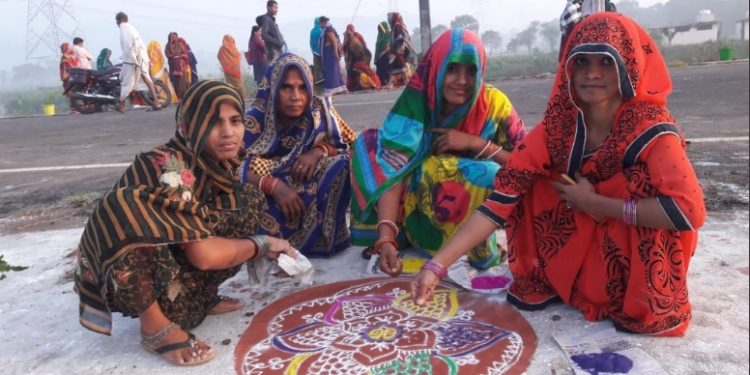Bhubaneswar: Roadsides in Ganjam district have started wearing a different look with colourful rangolis and potted tulsi (basil) plants adorning them, and the reason is more than just ornamental. Together, they are helping to keep a check on open defecation on the roadside that the district is notorious for.
In this innovative and regionalised battle against the scourge, women are playing a leading role as the district hitches itself to the sanitation bandwagon. The change has become possible with the active involvement of citizens, government, Swacchagrahis and Anganwadi workers.
This week, the State Rural Sanitation Mission office in Ganjam district tried to experiment with the idea to mobilise people to collectively fight the menace — through community participation. After some awareness and brainstorming sessions by the ground level women workers, women joined the movement en masse.
“The idea was conceptualised by the district administration and with the mass mobilisation of community level workers, the women joined the movement. The target is now the high vulnerable areas where open defecation is more evident,” said Gokul Maharana, District Project Coordinator, District Water Sanitation Mission, Ganjam.
Maharana told Orissa POST that the auspicious month of Kartik was intentionally selected to plant the sacred tulsi plants and draw rangolis on the roadsides after cleaning up the area, so that those who were used to open defecation could shun the unhealthy practice.
Locals said that in this district, villagers refrain from defecating in farmlands as they consider these as pious and instead target the roadsides. It is this practice that has thrown up the infamous ‘Ganjam Salute’ – when those defecating during the night stand up when vehicle headlights pick them out.
Buoyed with the initiative, the Office of the District Collector, Ganjam, has shared it online to take more people from the district onboard. Two district project coordinators, several Anganwadi workers and community level workers are going around the district to select high vulnerable areas and replicate the work in all places to discourage open defecation.
Such programmes have been planned in 10 gram panchayats of Sanakhemundi block, nine gram panchayats of Purusottampur block and seven gram panchayats of Kukudakhandi block in the district. According to the people involved in the mission, awareness programmes, special drives and replication of rangoli drawing and planting of tulsi plants are expected to be implemented in such areas.
Hopeless Hong Kong
The last nail into the coffin of whatever freedom is believed to be there in Hong Kong, a unique territory...
Read moreDetails




































